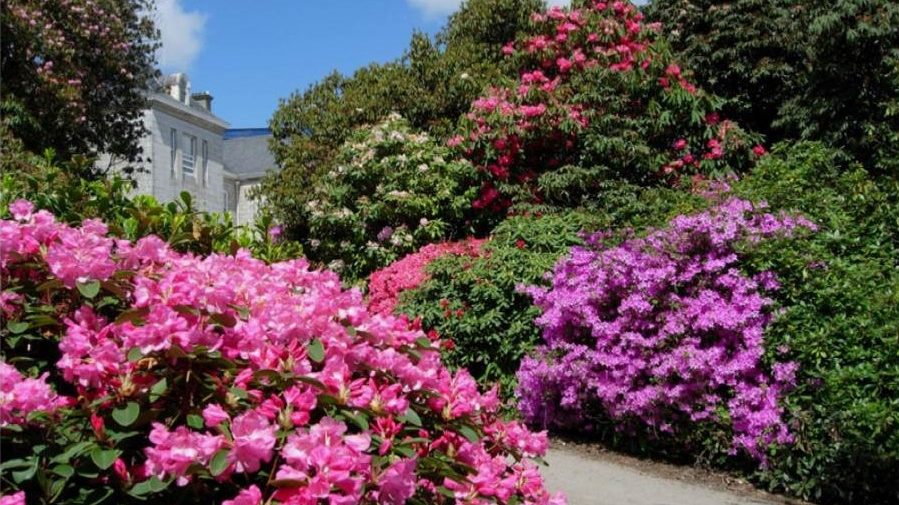The campus grounds at both Penryn and Falmouth Campuses blend historic sub-tropical planting with newly created landscapes to create visually stunning gardens that are a haven for a diverse range of plant and animal species.
We maintain and enhance acres of grounds and gardens across Falmouth and Penryn campuses. Our Green Flag-winning grounds at Penryn Campus are open for all to enjoy. Visitors can take in the walled garden, herbaceous beds, sub-tropical planting, fruit producing orchard, Italian garden and terraces, the 18th Century lime avenue, parkland, the old drive with pinetum native woodlands and the historic rare Rhododendrons, cultivated on the site in the Victorian era. Meanwhile, at Falmouth Campus, the historic, sub-tropical planting blends seamlessly with Fox Rosehill Gardens. Throughout the year we work with students and staff on a variety of projects and are often looking for volunteers to help out – for instance tree planting and maintaining vegetable allotment areas.
Biodiversity
Biodiversity, or biological diversity, is a term used to describe the variety of life and its processes. This includes the sheer amount of species on earth and the communities and ecosystems where they occur.
The Penryn and Falmouth campuses contain a range of different, rich habitats and provide a key link to other natural environments of importance in the surrounding area. The grounds are host to a wide variety of amphibians, birds, insects, mammals and reptiles, producing a diverse system of ecological niches, making this a fascinating place to study, work and visit.
We manage the estate with this in mind and acknowledge that the campuses contain a wide variety of habitats that are important to biodiversity. Some specific management examples include:
- As far as is practicable, to conserve and enhance existing valuable habitats and to create new habitats across the Penryn university campus
- In partnership with the Student Union to create a Biodiversity Action Plan (BAP) containing up to date campus action recommendations, including specialist treatment and protection measures for known vulnerable species and habitats e.g. known otter and badger sites
- To comply with any relevant UK legislation regarding biodiversity
- To always consider ecological impacts and opportunities for ecological enhancement of any building refurbishments and any new building designs or construction activities
- To seek to work in partnership with environmental groups and outside organisations, to share knowledge and resources
- To seek funding and grants to facilitate these biodiversity aims and principles
- To involve staff, students and the local community in biodiversity issues through promoting and identifying opportunities for all to engage in volunteering and educational activity
- To use biodiversity to promote healthy living and wellbeing through improved outdoor amenity areas
- Monitor the policy objectives
- To reduce the use of residual pesticides and increase the use of non-residual and biological/non-chemical control techniques
- To implement green waste management
- To achieve bronze level certification by 2021 and silver by 2022 with the Hedgehog Friendly Campus program run by the British Hedgehog Preservation Society.



